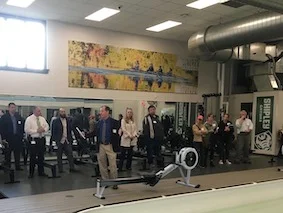Over 40 participants from 19 schools attended the PAISBOA Sustainability meeting at The Shipley School on April 4, 2019. The theme: “Creating Cultural Change” towards sustainability. Key highlights included a tour of the School that featured sustainability measures in its operations and infrastructure, a delicious plant-based dinner, and a presentation on cultural change.
Adam Wojtelwicz, CFO, explained that Shipley is home to 196 solar panels that generate 60 kW of clean electricity. The School diverts 4,500 gallons of rainwater through its robust irrigation system. New waste sorting stations are part of the school’s green efforts. For large scale events, younger students act as “Waste Watchers” to make sure guests properly compost, recycle or landfill waste. Shipley is one of fewer than five schools in the state that has a Certified Green Restaurant for its Avery Silverman Dining Room. The school implemented 57 sustainability measures for the Dining Room to receive an impressive 3-star rating.
Tamar Norquist, Shipley’s Sustainability Coordinator, emphasized that cultural change must be leveraged to instigate a sustainability movement. “Students are our future,” she noted. “There is a strong tide growing in our society in favor of sustainability and therefore it needs to become a part of our identity and outreach.” Norquist explained that behavior change is like an equation that can be achieved by summing up knowledge, convenience, motivation, and social norms.
Wojtelwicz mentioned that the path toward sustainability is not always the simplest one. He noted institutions must invest in value-based decisions to do the “right thing.” Through a combination of bulk electricity purchasing with PAISBOA and by converting to new light technology such as LED, Shipley saves close to $100,000 per year in electric costs. Wojtelwicz acknowledged the role of Boyer Sudduth Environmental Consultants in helping the school develop a process to translate sustainability ideas into actions.
Adam Wojtelwicz explains how Shipley repurposed building as a rowing tank to PAISBOA Sustainability Members
Chef Wayne Washington presented a low-waste, plant-based dinner made from locally sourced ingredients. As Lower School Science Teacher, Dan Del Duca, showed how sustainability is woven into the curriculum-- from water testing at a local source to overnight camp experiences for fifth graders at Echo Hill Camp in Maryland.
Wojtelwicz stated the key to success is to ensure that students are at the heart of sustainability efforts. Environmental Club student leader and senior, Lila Saligman, has seen a change in sustainability in the last year and a half. She noted, “Change can be new and scary. But making simple changes like switching to metal utensils instead of plastic is not scary. It’s the right thing to do.”
Norquist has been working with students and faculty to bring about change and the school’s hard work has paid off.
Wojtelwicz summed up the evening with this advice: “Build a village for sustainability measures - don’t give up and great things will happen.”
By Mahvish Ilyas, a recent graduate from University of Pennsylvania with a Master of Environmental Studies in Environmental Policy, Management & Business and intern at Boyer Sudduth Environmental Consultants.



